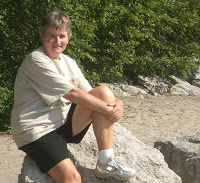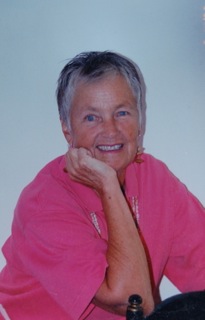According to my records, with this piece, I am starting my
seventh year of coming to tell and listen to stories on Monday afternoon.
seventh year of coming to tell and listen to stories on Monday afternoon.
It seems odd to think about hope in this grim start to what
may be a long and grim year of frustration, setbacks and bad news. This is not
a very hopeful time we live in. But maybe this is when we most need to remind
ourselves that hope is possible, hope is what keeps us going, hope is what gets
us out of bed each morning. And hope, no matter how irrational, is good to
have.
may be a long and grim year of frustration, setbacks and bad news. This is not
a very hopeful time we live in. But maybe this is when we most need to remind
ourselves that hope is possible, hope is what keeps us going, hope is what gets
us out of bed each morning. And hope, no matter how irrational, is good to
have.
So, my hope for the lesbian, gay and trans community is that
we learn to turn to each other more for joy and less out of necessity. I know
that fearsome problems still haunt our world and community. Violence and
bullying is a daily fact for many of our youth. Discrimination still runs
rampant in many areas. Determined gay-haters, like the soon to be
vice-president of the United States, persist in their work to undo the dignity
and security of LGBT lives and generate hostility toward us. There is still
plenty of inequality and prejudice out there.
we learn to turn to each other more for joy and less out of necessity. I know
that fearsome problems still haunt our world and community. Violence and
bullying is a daily fact for many of our youth. Discrimination still runs
rampant in many areas. Determined gay-haters, like the soon to be
vice-president of the United States, persist in their work to undo the dignity
and security of LGBT lives and generate hostility toward us. There is still
plenty of inequality and prejudice out there.
But in many ways, our world is getting less frightening and
our grasp on basic rights is growing more secure. It is no longer acceptable to
openly degrade gay people—which is why our enemies have to resort to ever
greater subterfuges to try to harass us. They’ve lost the sanctity of marriage
so now they are reduced to fighting for the sanctity of toilets and who shall
be allowed to do their business in which ones.
our grasp on basic rights is growing more secure. It is no longer acceptable to
openly degrade gay people—which is why our enemies have to resort to ever
greater subterfuges to try to harass us. They’ve lost the sanctity of marriage
so now they are reduced to fighting for the sanctity of toilets and who shall
be allowed to do their business in which ones.
We still have battles to fight, but my hope is that we will seek
out each other’s company less out of a sense of a need for protection, less out
of desperation, and more because we just want to be around other L, G, B and T
people. We come together not so much because we need to seek shelter in a
hostile world but more because we can best express ourselves with each other.
out each other’s company less out of a sense of a need for protection, less out
of desperation, and more because we just want to be around other L, G, B and T
people. We come together not so much because we need to seek shelter in a
hostile world but more because we can best express ourselves with each other.
I have many non-gay friends and love them dearly. It’s not
that I sense any barriers between us. Yet, there is still more I sense in sharing
with queer folk. We share experiences that we’ve all known and don’t have to
explain. We share a humor derived from being outsiders. We share
spiritualities, arts and a sharp sense of just what community is—or is not. We
have been forced to make up our own culture and so we have. We are different
and we should relish opportunities to engage those differences.
that I sense any barriers between us. Yet, there is still more I sense in sharing
with queer folk. We share experiences that we’ve all known and don’t have to
explain. We share a humor derived from being outsiders. We share
spiritualities, arts and a sharp sense of just what community is—or is not. We
have been forced to make up our own culture and so we have. We are different
and we should relish opportunities to engage those differences.
Most of us come out of a time when lesbians and gays could
never take anything for granted. And we shouldn’t. Above all, we shouldn’t take
each other for granted. You can find very fulfilling relationships with non-gay
people but I do believe that there is one thing we can find only with our own
kind—happiness. I do hope that organizations such as the community center we
are in continue to thrive—not out of fear and self-defense but from joy. We
still need to find each other. I hope that we continue to come here because we
want to, not because we have to.
never take anything for granted. And we shouldn’t. Above all, we shouldn’t take
each other for granted. You can find very fulfilling relationships with non-gay
people but I do believe that there is one thing we can find only with our own
kind—happiness. I do hope that organizations such as the community center we
are in continue to thrive—not out of fear and self-defense but from joy. We
still need to find each other. I hope that we continue to come here because we
want to, not because we have to.
Even in a world more tolerant and open, there is still that
special depth of connection that we get to see only in each other. Call it love
or desire or a magical ability to coordinate colors and a flare for decorating,
you won’t find it outside. You may be welcome to watch football games with
legions of Broncos fans, but you won’t get much of a response by commenting
that Eli Manning is so much better looking than his brother Peyton. They just
don’t get it.
special depth of connection that we get to see only in each other. Call it love
or desire or a magical ability to coordinate colors and a flare for decorating,
you won’t find it outside. You may be welcome to watch football games with
legions of Broncos fans, but you won’t get much of a response by commenting
that Eli Manning is so much better looking than his brother Peyton. They just
don’t get it.
© 8 Jan 2017
About the Author
Nicholas grew up in Cleveland,
then grew up in San Francisco, and is now growing up in Denver. He retired from
work with non-profits in 2009 and now bicycles, gardens, cooks, does yoga,
writes stories, and loves to go out for coffee.
then grew up in San Francisco, and is now growing up in Denver. He retired from
work with non-profits in 2009 and now bicycles, gardens, cooks, does yoga,
writes stories, and loves to go out for coffee.


